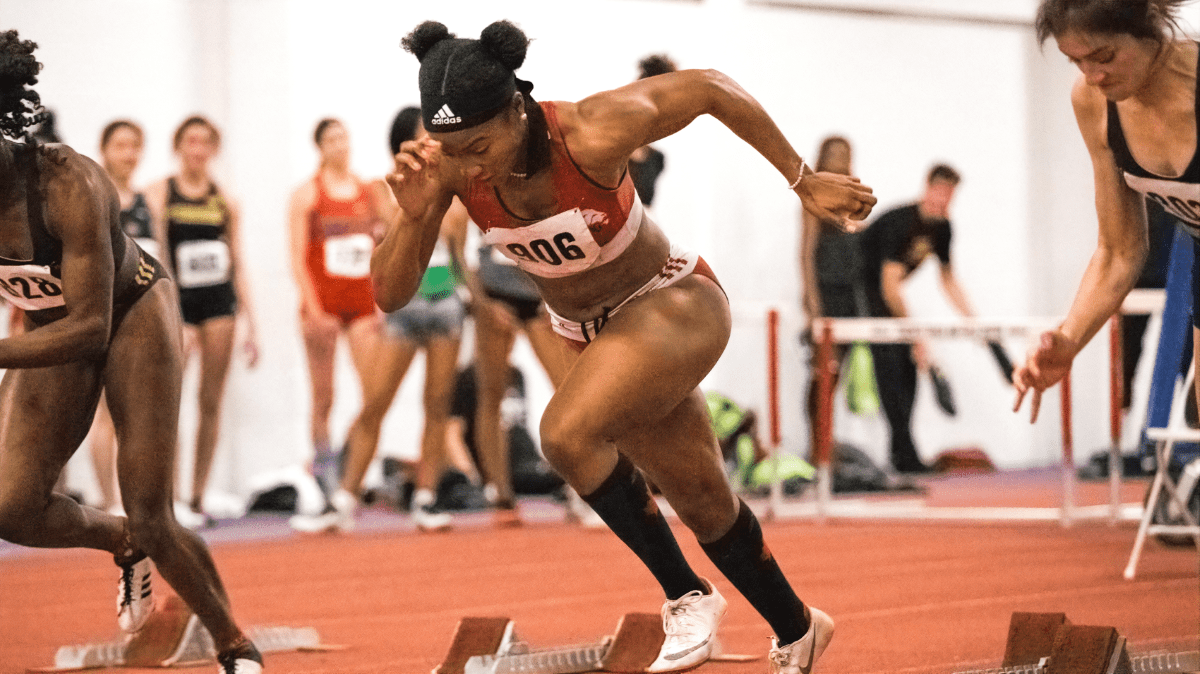Monique Simon-Tucker, social work student as well as varsity track and field athlete, takes the time to speak about her co-curriculars, as well as her academic and athletic career. We also take a deep dive into the topic of BIPOC individuals in sports.
This interview has been edited for clarity and brevity.
Excalibur: Do you have anyone that is a huge track and field inspiration for you?
Monique: I have a few right now. The year before I graduated there was Sheereen Harris — a former coach and fellow York alumni. She’s a really big inspiration. She was one of the team captains who was always out there encouraging people and getting everyone together.
I didn’t see myself as a captain before coming in — that’s just not me. Then before coach Colin Inglis left, he said, “She has leadership potential, put her in a leadership position.” It’s big shoes to fill to be leading fourth years, fifth years, and everyone. I just turned 18, I was the youngest of the pack.
The next person is Crystal Emmanuel who is the top 100 metre sprinter in Canada for the women’s competition. She also trains at the Toronto Track and Field Centre. She’s a very humble, down-to-earth person. You can hold a great conversation with her. She’s encouraging, cool, always has amazing socks! She is very open and a kind person.
E: What do you think you enjoy the most about being at York?
M: I think it’s the opportunities I’ve sought and how I’ve tried to put myself in positions to gain opportunities. If I see an application or something, I’ll just sign up. I’ll see if I make it to the next round or if I get the opportunity to work at the dean’s office or with another administration at York. Be it the athletics department, varsity, or all those other opportunities we work for, it doesn’t hurt to try and put yourself out there. That’s why I’m in several clubs. For example, I’m on the sports council, I’m on the executive committee, I’m the community navigator for social workers, the mentor program. Teni Odetoyinbo, a member of the Women’s soccer team, and I have started a Black and Indigenous varsity athlete student association.
E: Since this is a piece for Black History Month, I wanted to dive into race and sports. I know it’s not so much of an issue in York sports simply because of how diverse the university population is, but in general, why do you believe race representation in sports is an important thing?
M: I think it’s an important thing in terms of all levels of sport. From the athletes all the way to the administration and coaches in between. If we don’t have the representation or — I don’t want to say representation as a percentage, but if we don’t have enough people of colour in certain positions, the decisions made will leave out a certain perspective. No matter what you say, whether it be “I understand you” or “I understand where you are coming from,” and I’m not saying all Black people have the same experience.
It’s the fact that some white perspectives are so far fetched than that of a person of colour, which shows itself when considering that the former makes the policies, the rules, and regulations and they set the expectations. I think one thing I had to bring up was that a white person didn’t notice that the land acknowledgment wasn’t said at any of the games. It’s just that people who are white wouldn’t recognize something like that — they wouldn’t recognize the issues. Those are the things that need to be addressed. This is why we are working to update the code of conduct because it does not include anything specific regarding race or sexual bias, things that are important.
E: How do you think sports have shaped the Black Lives Matter (BLM) movement in the past couple of months?
M: I think the opposite. I think the BLM movement has caused a lot of administration and coaches to reflect on their position and team dynamics. We can say there are a lot of students like myself, Teni, and other schools who are doing their own alliances and committees. We are only students after all. For us to do this is one thing, but we have to disassemble the different levels of coaches, volunteers, and the people we are working one-on-one with as athletes.
We need to look at their perspectives, how they are being trained, how they are being educated. I think that’s what BLM has taught us. This is not a once in a while issue. Even though it occasionally comes up in the media, this is a daily occurence in everyone’s lives. This allowed coaches to wake up and ask their athletes “what can I do to help? What can I do now?” If they aren’t asking those questions, what does the administration as a whole need to do to educate their coaches to the level they need to be at to work with athletes of colour, Indigenous groups, and all minority groups to make their athletic experience the best possible?
We can start by evaluating their hiring process to see and acknowledge its flaws, and then release said info. A lot of administration and sporting organizations did put out a statement, but we can say the statement is not enough. They didn’t even acknowledge that they were the problem. They said they were supportive, but didn’t acknowledge that they contributed to the problem by not having any Black women or men in any position of power in the organization.
If you can’t acknowledge that, you can’t move to the education piece. You’re ignoring it all just to say “we support you.” How are you supporting me if you’re not reevaluating and reworking your hiring process? Don’t expect people to just be okay after all of that.




